Table of Contents
For those with internet radio and broadcasting commercial music, you must obtain a blanket license. It guarantees your radio is copyright-covered. In this guide, I’ll tell you about the process for obtaining a blanket license for webcasting (known as live broadcast, internet radio) in the UK and Europe and how to predict your expenses.
NOTE: Your radio could be hosted anywhere, but if the blanket license covers certain territories and all others should be blocked programmatically.
Definitions
Here are the definitions of popular terms used in the guide.
Webcasting
Webcasting is the distribution of audio or video content to a large audience via the internet. It’s similar to traditional broadcasting, but instead of using airwaves, webcasting uses the internet to deliver content.
The term “webcasting” generally refers to the non-interactive streaming of media, usually audio or video, via the World Wide Web.
There are two main types of webcasting: live and on-demand. Live webcasts are streaming broadcasts that happen in real time, like a concert or sporting event. On-demand webcasts are recorded and can be watched anytime, like a TV show, podcast, or movie.
Linear and non-linear radio
There are two main types of internet radio in the UK: linear and non-linear. Linear radio is where you listen to a live stream of a radio station, while non-linear radio is where you can listen to on-demand content or podcasts.
A linear license is required if you’re broadcasting a live stream or pre-recorded program on your internet radio station. This includes traditional radio stations that are streaming online as well as internet-only radio stations.
A non-linear license is required if you’re offering on-demand streaming of music on your website or app. This includes services like Spotify, Apple Music, and Amazon Music.
Streams
Broadcasting on the internet is often done through what are called streams. A stream is simply a flow of audio that can be accessed by computers and other devices connected to the internet. In the context of internet radio, a stream is a continuous flow of digital audio data that can be played back by a user in real-time.
Listening hours
Listening hours (also known as TLH or ATH) are the number of hours per certain time that a person spends listening to a particular radio station. The average person in the UK spends around four hours per week listening to the radio, so obtaining a blanket license for UK internet radio stations should be a relatively easy process. However, there are a few things to keep in mind when applying for such a license.
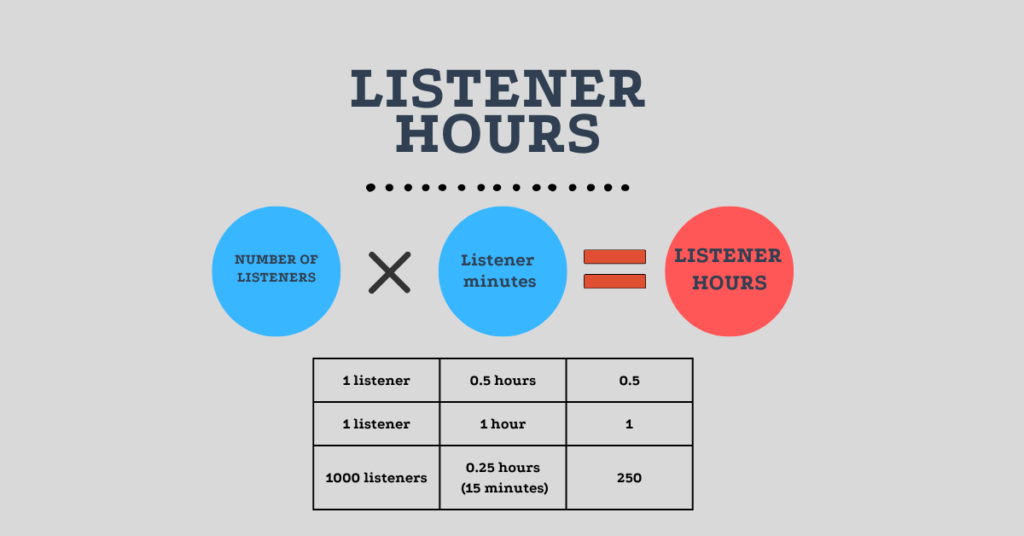
Number of listeners x (Listener minutes ÷ Minutes in an hour) = Total Listening Hours
What is a blanket license?
A blanket license is a type of license that allows the licensee to play any or all of the copyrighted works in a catalog for a set period of time. This type of license is typically used by radio stations, and it can be obtained from the copyright holders directly or through performing rights organizations (PROs).
A PRO, or performance rights organization, is an organization that represents songwriters, composers, and music publishers. They work on a territorial basis.
You can also negotiate directly with music copyright holders, or you can use a licensing platform like TuneCore. I don’t recommend this, because you need to make an agreement with songwriters, composers, and music publishers for every single song! Also, the price for broadcast could be higher than the provided by the blanket license.
The blanket license allows Internet radio stations to play any music from its repertoire of over 10 million songs. This includes Top 40 Songs and even not popular tracks.
Who is granting a blanket license in the UK?
One way to obtain a blanket license for internet radio in the UK is to join a PRO. By joining a PRO, you will be able to blanket license all of the music in their repertoire. You will also be able to negotiate your own rates and terms with the PRO.
In the UK, there are two – PRS for Music and PPL. All of these organizations collect royalties when their members’ music is performed publicly.
This license is ideal for businesses that operate multiple internet radio stations, or for those that wish to offer their listeners a wider range of music.
You must obtain a license from both organizations!
PRS for Music
PRS for Music offers a variety of licenses, including a LOML License and LOML+. The LOML License covers all non-interactive internet radio services. PRS for Music also offers a variety of other licenses, including those for public performance, broadcasting, and synchronization.
PPL
PPL is a UK-based company that offers a blanket license for internet radio stations. This means that you can play any music you want on your station, as long as you pay an annual fee to PPL. The fee is based on the number of listeners you have, so it’s important to keep track of your audience size. You can sign up for a PPL license online, and the process is pretty straightforward. Once you’re registered, you’ll have access to a huge library of music to choose from. So if you’re looking to start an internet radio station in the UK, or anywhere in the EU, PPL is definitely worth checking out.
PPL is a collecting society in the United Kingdom that licenses recorded music on behalf of performers and record companies. PPL licenses recorded music played in public or broadcast on the radio, online, and in clubs, and distributes the royalties to the performers and record companies.
PPL has over 150,000 members including major labels, independent labels, performing artists, and session musicians.
Differences between PPL and PRS for Music
If you’re an internet radio station based in the UK, you need to obtain a blanket license from either PPL or PRS for Music. But what’s the difference between the two organizations?
PPL licenses recorded music played in public, while PRS for Music licenses the public performance of musical works. So, if your internet radio station is playing recorded music, you need a PPL license. If you’re playing music that’s been composed and published, you need a PRS for Music license.
PPL collects royalties on behalf of performers and record companies for the use of recorded music, while PRS for Music collects royalties on behalf of composers, songwriters, and music publishers for the use of musical compositions. In order to obtain a blanket license from either organization, you will need to provide proof of your internet radio station’s existence and listenership.
Limitations of the blanket license
There are a few limitations of the blanket license.
Non-interactive and Interactive
There are two main types of internet radio stations: non-interactive and interactive. Non-interactive radio stations are those that play pre-recorded music and do not allow listeners to choose what they want to hear. Interactive radio stations, on the other hand, allow listeners to request specific songs or artists.
PPL and PRS have a different licenses for both forms of broadcasting!
A license for Interactive radio allows the right to play any music, as long as it is requested by a listener.
Interactive radio requires a higher licensing fee. This is because interactive radio provides a higher level of service to listeners, and thus creates more value for the copyright holders of the music.
Territorial limitations
The blanket license only covers internet radio stations that are based on a certain territory.
Blanket licenses are only available in the UK, so if you’re looking to obtain one for internet radio broadcasting in other parts of the EU, you’ll need to look to local associates.
Actually, PPL covers EU territories but charges more for a license.
This is not the case when we speak for PRS for Music. They cover ONLY the UK territory. Look below for more information on how to obtain a license for Europe.
You must block access to your radio for all territories where you have no right to broadcast. If you get a license from PPl and PRS for the UK, then you have to GEO-block others countries.
To unlock a country, you have to obtain a separate license from each country/territory. For example, if you want to start a radio in Australia, you need to contact PPCA.
Commercial and non-commercial
Firstly, a blanket license is required for any commercial or non-commercial use of music on the radio. Secondly, the fees for a blanket license vary depending on the type of service you provide and how many stations you operate.
The price of the license depends on the annual revenue of the radio.
The benefits of having a blanket license
First, it ensures that all of the music played on a station is legal and can’t be traced back to the artist or record label. Second, it allows radio stations to have a wider variety of music to choose from since they don’t have to get individual licenses for each song. Finally, it allows stations to save money in the long run, since they only have to pay one set fee instead of multiple fees for each song.
- You’ll be covered for all the music you use.
- You won’t have to worry about tracking down and paying royalties for every single song you use.
- It’s simple and straightforward – once you have your blanket license, you’re good to go!
- Having a blanket license shows that you’re serious about complying with copyright law, which can only be a good thing.
- It gives you peace of mind, knowing that you’re not risking any legal action being taken against your station.
- It allows you to play any type of music you want without having to worry about obtaining separate licenses for each song. In addition, it also covers you for any copyright fees that may be associated with playing music on your internet radio station
Disadvantages of having a blanket license
One of the biggest disadvantages is the cost. A blanket license can be quite expensive, especially for a small internet radio station. Additionally, a blanket license may limit the music you can play on your station: limiting what you can play on your station and how often you can change your programming; as well as broadcasting one song is possible at a certain time or you cannot play out more than 3 songs by an artist in an hour.
The blanket license has a minimal annual fee and it’s not scalable. Perhaps, you’ll overrate or underestimate your consumption and this will cause losses or additional fees. Most license bodies sign with you based on the forecast. If you’re a newbie, then will met problems making accurate estimations.
As many songs as you broadcast on a hour, as higher you’ll pay for a blanket license.
Usually, they don’t cover synchronization rights, music in adverts, sponsorship, etc (read below).
How can I obtain a blanket license for UK internet radio?
My advice is to contact PPL and PRS for Music directly before sending an application by email.
PPL Application
If you want to obtain a blanket license for UK internet radio from PPL, you need to fill out an application form. The form can be found on the PPL website. Once you have filled out the form, you will need to submit it to PPL along with the required documentation.
To apply for a license, you will need to provide information about your website or app, including its URL, a description of how it uses music, and details about any revenue streams. Once you have submitted your application, PPL will assess your case and get back to you with a decision. If your application is successful, you will be asked to sign a license agreement and make a payment.
PRS for Music Application
To apply for a blanket license, internet radio stations will need to provide PRS for Music with some basic information about your service, including the website URL and a list of the tracks intend to be broadcast. Once the application has been processed, PRS for Music will issue a license agreement which must be signed and returned. Once this has been received, the station will be able to start broadcasting PRS for Music repertoire.
- Go to the PRS for Music website and create an account.
- Once you have created an account, log in and click on the ‘Blanket Licenses’ tab.
- On the Blanket Licenses page, click on the ‘Apply for a License’ button.
- Fill out the application form and submit it.
- Once your application has been processed, you will be issued with a blanket license which will allow you to play music on your internet radio station from anywhere in the UK.
Extend your blanket license to the EU
As I mentioned before, PPL will release you a license for almost the whole of Europe but PRS for Music cannot.
PPL offers a European blanket license that covers all 28 EU member states. This license will allow you to play any music that is licensed by PPL in your jurisdiction, as well as music that is registered with PPL in other EU countries + the UK.
This is not the same for PRS for music since they cover only broadcasting on UK territory.
Consider using the ICE service from PRS for Music and related European licensing bodies. With this service, you can extend your blanket license to cover the EU. This is a great alternative for those who want to be able to reach a wider audience with their internet radio station.
PRS for Music is a collecting society that administers public performance rights in the UK and Ireland. Their alternative is ICE, a new pan-European licensing service.
Do you really need to broadcast in multiple territories?
There might be some benefits to doing so, but it’s important to weigh those against the costs and potential complications. Second, what EU countries do you want to target? Each country has its own rules and regulations surrounding internet radio, so you’ll need to do your research. Finally, make sure you’re familiar with the terms of your blanket license and any restrictions that may apply.
If you’re going to play out commercials, multi-territory radio will earn more advertisers with an extended target of countries. Potentially, you’ll need to find brands that would like to be promoted in the whole of Europe.
Think about this wisely!
How much does a blanket license cost?
Every license body has absolutely different ways of calculating license fees. Note: The prices could change anytime. Also, PROs release new rates at the beginning of each year.
PRS for Music
PRS offers two licenses for internet radio. Your license fee is depending on two main criteria: the gross revenue of the radio and the number of streams that have been broadcasted.
LOML
A blanket license from PRS for Music in the UK starts at £154 + VAT per year. This covers you for all the music you use on your internet radio station, no matter how many listeners you have.
The plans are divided into various tariffs called “BANDS”.
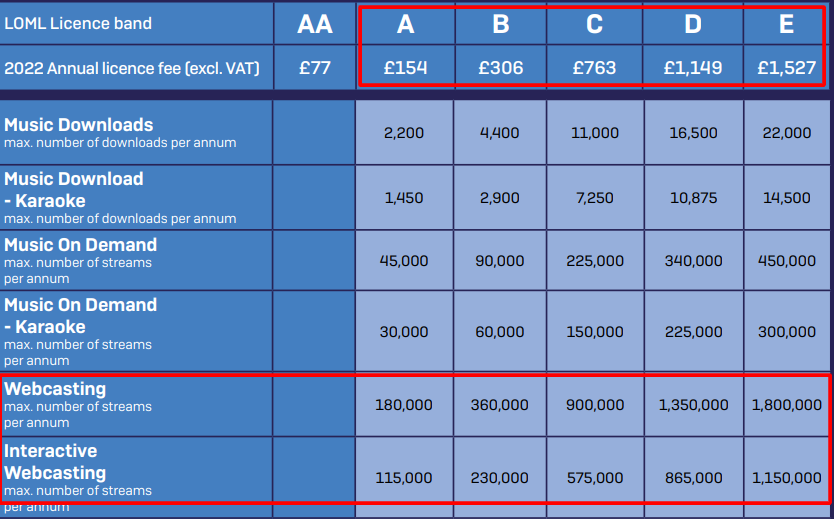
The price includes 115 000 streams per annum for interactive internet radio. This means about 315 streams per day. In case, you’re non-interactive webcasting, then for the same price, you’ll get 180 000 streams annually or about 493 streams per day. Later, I’ll explain more.
As I mention before, the licenses are not scalable (flexible to the real radio consumptions). You can consume 30% of the 180 000 streams but you’ll pay the fee of £154 + VAT per year.
LOML supports up to 1.8M streams per year. For more than this, you need to upgrade to LOML+.
LOML+
The Limited Online Music Licence+ (LOML+) is for music services that exceed the gross revenue threshold or usage caps of LOML.
For those who expect big exposure and good revenue from their radio station, and the gross revenue passed £12,500 and up to £200,000, then they must send an application for LOML+ License. Also, no matter of the revenue if you exceed the number of streams per year of LOML (the maximum is 1.8M for webcasting and 1.15M for interactive radio), you have to upgrade to LOML+ which covers up to 22.8M streams per year.

The price for webcasting starts at £2,598 with a max. streams yearly of 3M. For the interactive webcast, the same price corresponds with 1.9M streams.

How to calculate the number of streams?
For example, we have a total of 1000 listeners per day who listen to the radio program for an average of 30 minutes, and the radio broadcast an average of 12 songs per hour per day.
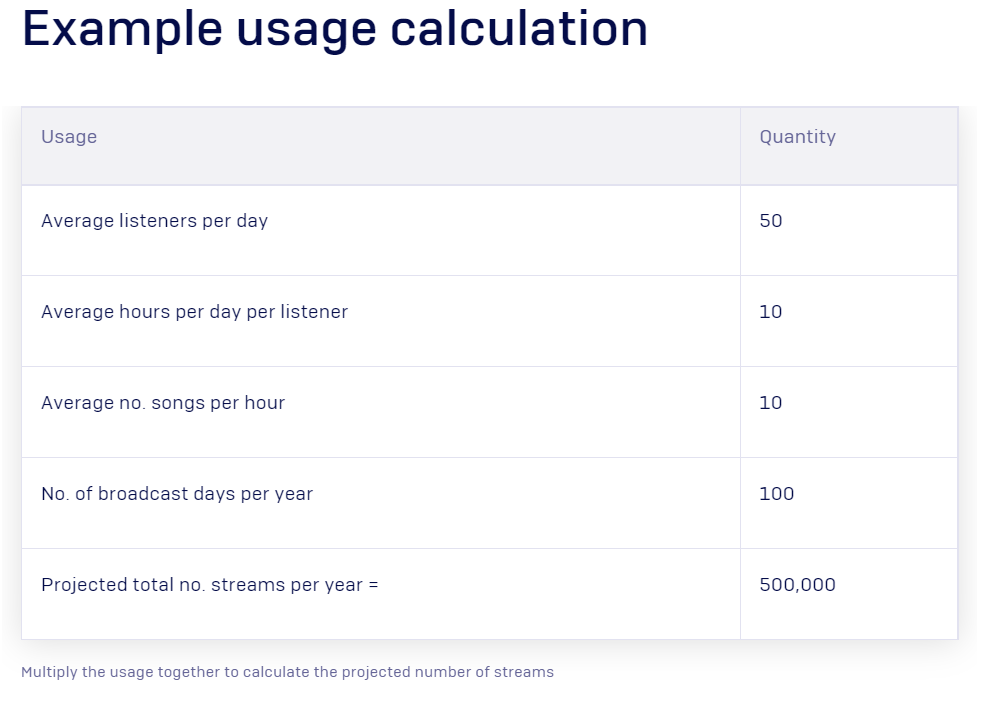
1000 listeners x 1-hour x 12 average number of songs streamed per hour x 1 broadcast day = 6000 streams per day or 2 190 000 streams per year. This way, you need a LOML+ License that covers over 1.8M streams. The price for the lowest Band is £2,598 (up to 3M streams).
But let me calculate the streams by a user:
1 listener * 0.5 (30 minutes) x 6 songs x 1 broadcast day = 3 streams a day per user.
Reporting Consumption
They have a simple need to know how many songs you’ve broadcasted in the period and what is your annual revenue. Usually, they insist on an annual report.
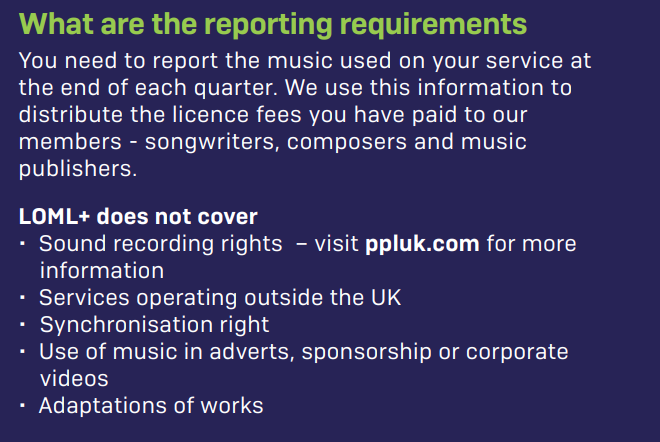
PPL
PPL suggests one license package for linear webcast services. They’re divided into 3 levels, also known as “BANDS”.
Three criteria define the fee of the blanket license by PPL: the number of streams, the annual revenue of the service, and the territories that the license covers.

Every band has a minimum fee!
BAND 1: £157 non-returnable fee for up to 150 000 streams per year.
BAND 2: £262 non-returnable fee for up to 270 000 streams annually.
BAND 3: £525 non-returnable advance, recouped against £0.001049 (0.1049p) per stream.
Only BAND 3 allows your service to broadcast in multiple territories and PPL adds a £68 administrative fee.
PPL limitations
Only recording rightsholders are covered under Spain’s reciprocal arrangements. Online linear webcasting services that wish to webcast to users in Spain will also need to clear the relevant performer rights through AIE.
France is no longer a signatory to the Reciprocal agreement as of January 1st, 2021. You need to contact SPRE for broadcast in France.
When using broadcasting in multiple territories you must meet the following limitations: the service has a maximum of five channels and does not generate more than five million streams per year.
How to calculate the number of streams?
If you have 1000 listeners per day and they listen to the radio program for 30 minutes per day, then:
1000×30/60=30,000/60 = 500 streams (listening hours per day, or 500×365 = 182 500 streams per year). This way, if you’re not planning to expand your license to multiple territories then the fee will be £262 (up to 270 000 streams in BAND 2).
BUT PPL has a complicated formula to calculate your annual fee in BAND 3 if you cover multiple territories or the radio broadcasts more than 270 000 streams per year:

A: GBP 0.001049 per broadcast
B: 12 songs aired per hour (daily average)
C: Average cost per listener hour – £0.012588
D: 1000 listening hours for the day (1000 listeners * 1 listening hour)
E: Total amount per day is 1000£ x 0.012588 = £12.588
G: The amount per year is 365*12.588 = £4594.62
They’ll charge you £525 in advance and next they will be recouped against the full amount of £4594.62. This means you have to pay £4069.62
Let me calculate per listener:
A: GBP 0.001049 per broadcast
B: 12 songs aired per hour (daily average)
C: Average cost per listener hour – £0.012588
D: 1000 listening hours for the day (1 listener * 1 listening hour)
E: Total amount per day is 1£ x 0.012588 = £0.012588
G: The amount per year is 365*12.588 = £4.59
Don’t forget the minimum fee is £525. No matter if the final amount is less.
Reporting Consumption
PPL needs:
- The average number of tracks webcast per hour
- The total listener hours for your service in that period.
The two numbers are typical statistics that your streaming service typically keeps. The term ‘TLH’ may be used to refer to listener hours, as well as other things such as ‘Aggregate Tuning Hours’ or ‘ATH.’ Simply add the two values together to get the number of streams (Performances) generated by your service in any given time period.
The Territory Report percentages reflect the total number of streams from your service broken down into territories that are part of your Linear Webcast Licence agreement (e.g. 60% UK, 28% Germany, 12% Greece). This information is generated by your streaming provider and can easily be accessed. PPL will provide you with reporting templates to fill in all the information.
| Band | Webcasting Report | Territory Report | Music Usage Report | Revenue Report |
| 1 | Required twice per year | Not required | On request | On request |
| 2 | Required twice per year | Not required | On request | On request |
| 3 | Required quarterly | Required quarterly | Licensees that recoup their advance, or use a digital playout system: Quarterly Others: On request | On request |
ICE service (Licensr)
The ICE Direct license is for multi-territory music radio stations (meaning active in at least two of the territories that they cover with annual revenues less than €250,000 in total across all territories.
License fees are calculated by taking into account the usage data you supplied in the application and precedent royalty rates as a percentage of revenue, with a minimum per usage or subscriber. Royalty rates and minima are influenced by the service’s functionality and our minimums take local economic factors into consideration.
Four criteria define the fee of the blanket license by ICE: the number of streams, the annual revenue of the service (and the model of monetizing – subscription or ad-supported), and the territories that the license covers, and the genres.
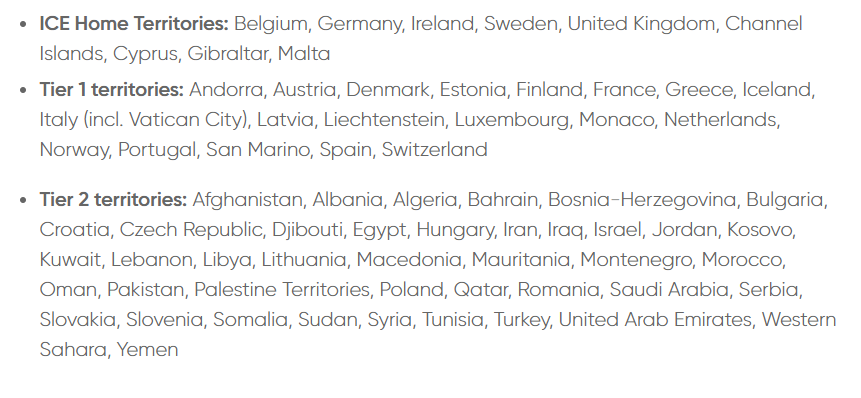
This way, for ad-supported webcasting in Tier-1 countries like Belgium, Germany, Ireland, Sweden, United Kingdom, Channel Islands, Cyprus, Gibraltar, Malta, with up to 1M streams and not more of €5,333 revenue per year, the price is €360. If we talk about other territories then the price is only €96.
Reporting Consumption
ICE wants reports about how much music you’ve broadcasted in the period divided by the territories and what is your annual revenue for the radio. Usually, they insist on an annual report.
How to calculate the number of streams?
If the length of a recording is 30 seconds or more, this means that each time a user plays such work for at least 30 seconds, unless the recording is less than 30 seconds in which case it will count as a stream regardless of how long it is played.
This way, if you have 1000 concurrent listeners per hour and you broadcast 12 songs per hour (and they listen for at least 30 seconds), then your consumed streams per hour will be 12 000. Or 288 000 streams a day.
NOTE: Perhaps, you’ll not have 1000 listeners at any second. On average, the listeners will listen for 15 minutes (~4 songs) and they will leave. Let me calculate the consumption for 1 listener:
1 listener * 4 songs = 4 streams per listener.
I mention that the lowest fee for Tier-1 countries is €360 per year and includes 1M streams.

1M streams / 4 streams per listener = 250K listeners per year (684 per day)!
or if the listener stays for an hour:
1M streams/12 streams per listener = 83 000 listeners per year

Consider combining a blanket license with a sync license
A sync license is required whenever you use copyrighted material in audio production. This includes using music as part of your internet radio show. If you plan talk shows using music as a background, then consider getting a sync license. Also if you plan to convert your radio programs to podcasts.

Note: Blanket License allows you to broadcast music and nothing more!
Conclusion
If you want to start an internet radio station in the UK or Europe, you will need to obtain a blanket license from PRS for Music (ICE Services) and PPL UK. This will allow you to play any music you like on your radio station, as long as you pay the appropriate royalties. The process for obtaining a blanket license is relatively straightforward, and once you have it in place, you can start broadcasting immediately.
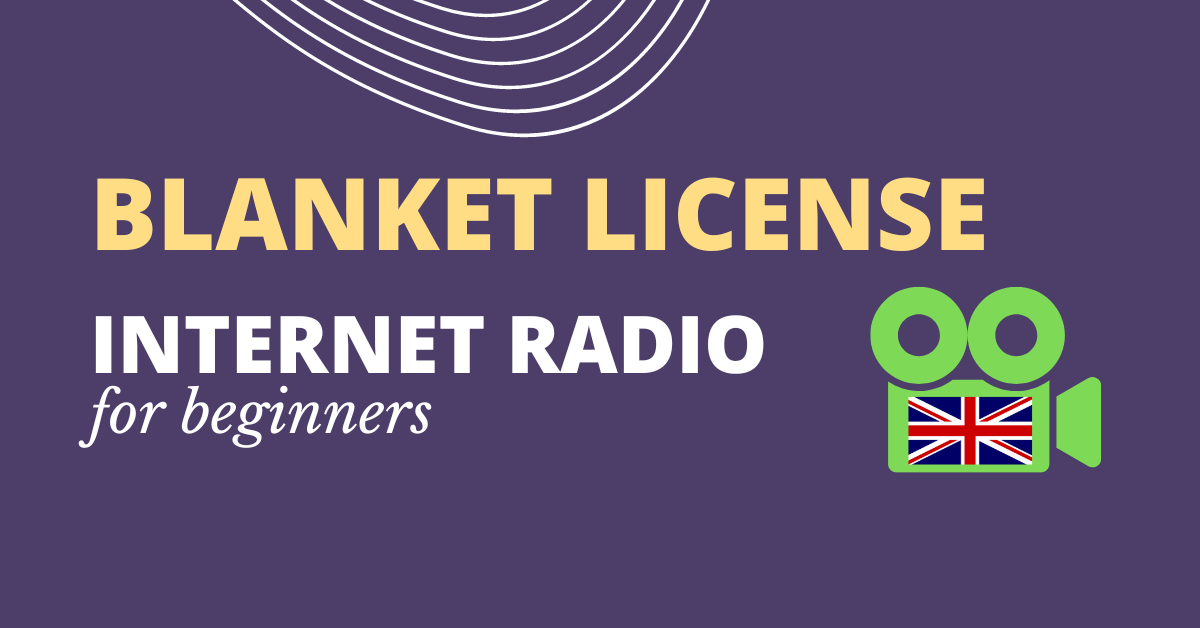
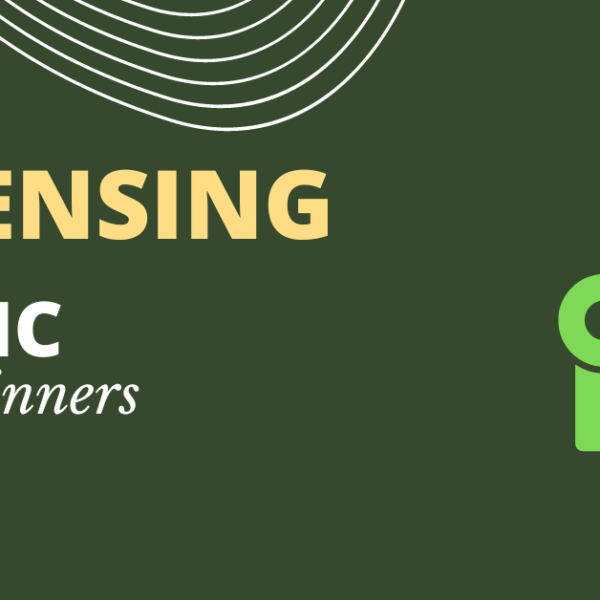

I think this is among the most important information for me.
And i am glad reading your article. But want to remark
on few general things, The website style is wonderful, the articles is really
great : D. Good job, cheers
Hi there, just became alert to your blog through Google, and found that it’s truly informative. I’m gonna watch out for brussels. I will be grateful if you continue this in future. Many people will be benefited from your writing. Cheers!
Hello from Sporthappy.